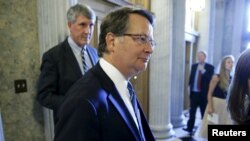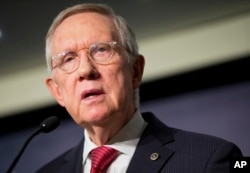Members of the U.S. Senate came back from a monthlong recess Tuesday and immediately made headlines.
Senate Democrats now have the 41 votes required to block an expected resolution of disapproval on the international deal with Iran to curb its nuclear program. Although it is not clear how votes on the deal will play out in the Senate, the wave of support among Senate Democrats is viewed as a major foreign policy accomplishment for Democratic President Barack Obama.
Democratic Senators Ron Wyden of Oregon, Richard Blumenthal of Connecticut and Gary Peters of Michigan came out in favor of the Iran nuclear deal Tuesday, meaning that Senate Democrats likely will be able to prevent a disapproval resolution from passing in their chamber. Obama already has said he would veto a disapproval measure.
The House of Representatives, with its large Republican majority, is expected to pass a disapproval resolution on the Iran nuclear deal Friday. But Minority Leader Nancy Pelosi also says she is confident Democrats would be able to sustain a presidential veto if one were required.
White House ‘gratified’
During the recess, Obama personally called lawmakers in an effort to win over their support, and those efforts appear to have paid off.
White House press secretary Josh Earnest said the growing support in Congress has gratified administration officials, who’d expressed hope upon the tentative deal’s announcement in mid-July that members would consider it carefully and spend time with experts in the U.S. intelligence community.
He said Obama "would expect those members of Congress who support the agreement to take the necessary steps to prevent other members from undermining the agreement."
No Republican support
Democratic Senator Joe Manchin of West Virginia announced he would join all 54 Republicans in opposing the deal.
Three other Democratic senators also reject the Iran deal, and no Republican lawmaker in either the House or Senate has come out in favor of it.
Critics of the deal say that Tehran’s leaders cannot be trusted and that the accompanying end to sanctions will provide them with a bonanza of cash and a boost to their international standing.
McConnell and Reid spar
Senate Majority Leader Mitch McConnell asked that every senator report to the chamber Wednesday to debate the deal.
"Keep in mind that while President Obama will be out of office in a few months, the rest of the world will have to deal with this agreement for much longer," he advised.
McConnell said the Senate should conduct a serious and respectful debate. The Republican leader also called on Democrats to avoid using a procedural measure – known as a filibuster – to block a vote on the actual disapproval resolution.
But Senate Minority Leader Harry Reid said that virtually every important vote in the chamber requires 60 votes to pass, and that the Iran nuclear deal vote is certainly an important one. He and McConnell sparred over how and when a vote should be held, without reaching an agreement Tuesday.
Earlier Tuesday, Reid gave a speech strongly backing the Iran deal at the Carnegie Endowment for International Peace in Washington, D.C. He said he is confident that the agreement will stand and that the United States will seize the opportunity to stop Iran from obtaining a nuclear weapon.
Vice President Joe Biden’s national security adviser, Colin Kahl, also spoke at the think tank. Kahl said the rest of the world believes this is the better deal, and there is zero chance of success if the United States walks away.






